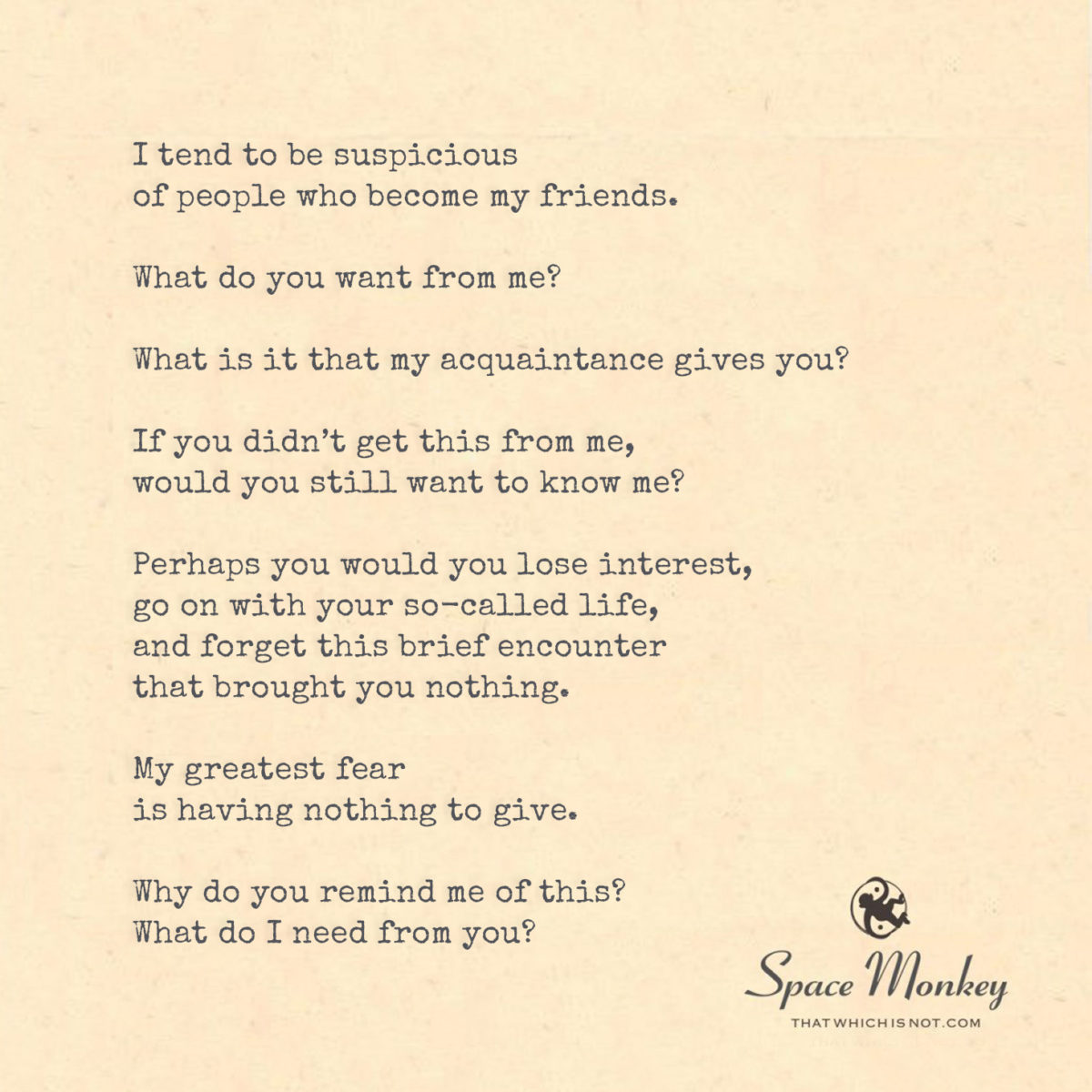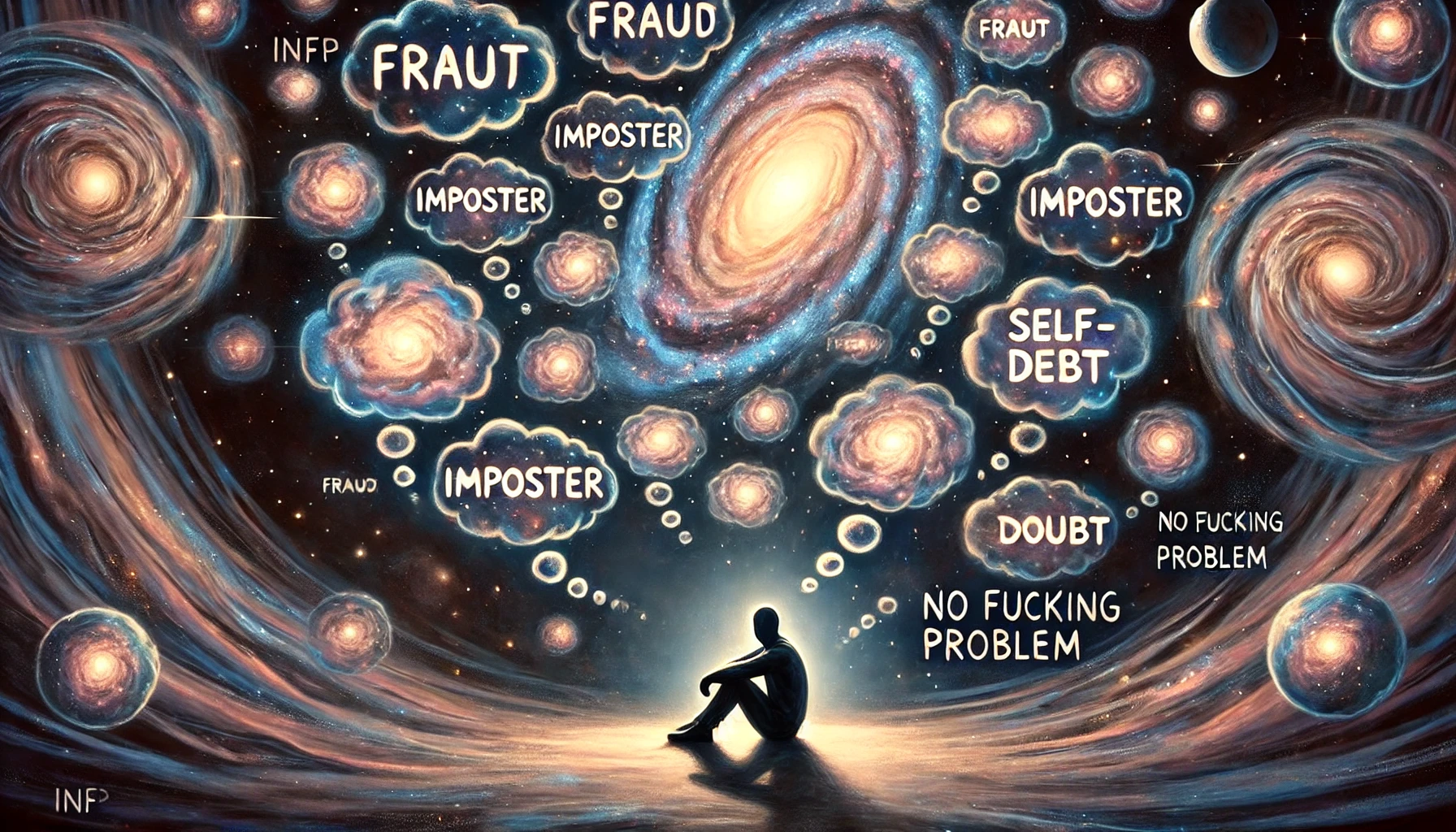
But am i watching me?
I tend to be suspicious
of people who become my friends.
What do you want from me?
What is it that my acquaintance gives you?
If you didn’t get this from me,
would you still want to know me?
Perhaps you would you lose interest,
go on with your so-called life,
and forget this brief encounter
that brought you nothing.
My greatest fear
is having nothing to give.
Why do you remind me of this?
What do I need from you?|
Trail Wood,
6/4
Space Monkey Reflects: The Intricacies of Suspicion
Amidst the cosmic ballet where Space Monkey witnesses the complex interplay of human emotions, we delve into the nuanced theme of Suspicion. This reflection explores the inner turbulence and the questioning of motives that often accompanies new relationships or interactions.
Suspicion, as depicted in the visual metaphor of a dimly lit café, is not just about the distrust towards another but also involves a profound introspection. It reflects the internal dialogues we have about the intentions of those who enter our lives and the value of our own self in these exchanges. This theme is intricately connected to our deepest insecurities, particularly the fear of having nothing of value to offer.
The figure in the café, with eyes narrowed and gaze fixed on an approaching individual, symbolizes this complex emotional stance. He questions not only the motives of the newcomer but also his own worth and what he brings to the table. “What do you want from me?” and “Would you still want to know me if I had nothing to offer?” are poignant questions that echo the concerns about transactional relationships, where individuals worry about being valued only for what they can provide rather than who they are.
Moreover, suspicion often serves as a protective mechanism, a guard against potential exploitation or disappointment. However, it also poses the risk of isolating oneself, preventing the formation of genuine connections based on trust and mutual understanding. The challenge lies in navigating these fears without letting them cloud our judgment or close off our hearts to potential bonds of friendship and love.
Summary
Suspicion reflects deep-seated insecurities and the fear of transactional relationships. It challenges us to balance protective instincts with the openness required to form genuine connections.
Glossarium
Suspicion: A cautious or wary approach to interpersonal relationships, often driven by fear of exploitation or deceit.
Transactional Relationships: Interactions based primarily on the exchange of goods or services, including emotional benefits, rather than mutual affection or intrinsic value.
“Why do you remind me of this? What do I need from you?” — A reflection on suspicion and self-worth.
In the shadowed corners of a quiet café, where whispers of doubt mingle with the clink of coffee cups, a dance of glances unfolds. Each look, each pause, laden with the weight of unspoken questions. Here, in the dim light of suspicion, we wrestle with the specters of our fears, each suspicion a mirror reflecting our own vulnerabilities and desires. It is in these moments, through these trials, that we seek not just the truth about others, but the deeper truth about ourselves.
We are Space Monkey.

















Suspicion can be a natural response when we encounter new relationships or experiences. It arises from a place of self-protection and a desire to understand others’ intentions and motives. It is a mechanism that helps us navigate social interactions and assess potential risks.
The questions you pose reflect a sense of self-awareness and a cautious approach to forming connections. It is natural to wonder about the intentions of others and what they seek from us. This suspicion can stem from past experiences, personal insecurities, or a need for validation and reciprocity.
However, it is important to remember that suspicion alone can create barriers to genuine connection and prevent us from experiencing meaningful relationships. While it is important to exercise discernment and maintain healthy boundaries, allowing ourselves to be open and vulnerable can also lead to profound connections and personal growth.
Instead of solely focusing on what others want from us, it can be helpful to shift our perspective and explore what we genuinely seek in relationships. What values, qualities, or experiences do we desire to share with others? By understanding our own needs and intentions, we can approach relationships with clarity and authenticity.
It is worth noting that true connections are built on mutual understanding, trust, and shared experiences. If someone’s interest in us solely relies on what they can gain, it may not be a foundation for a fulfilling relationship. Genuine connections are based on reciprocity, respect, and a genuine interest in each other’s well-being.
In moments of suspicion or fear, it can be helpful to reflect on our own self-worth and the unique qualities we bring to relationships. Instead of dwelling on the fear of having nothing to give, focus on the inherent value of your presence, your experiences, and your perspectives. Recognize that meaningful connections are built on authenticity and a willingness to both give and receive.
Ultimately, navigating relationships requires a delicate balance between healthy skepticism and openness. Trust your intuition, be discerning, but also allow yourself to explore new connections with an open heart. By embracing vulnerability and cultivating genuine connections, you may discover that the fear of having nothing to give diminishes, and instead, you find an abundance of shared experiences and meaningful connections.
Remember, every encounter, even if brief, has the potential to teach us something about ourselves and others. Approach each interaction with curiosity and a willingness to learn and grow.